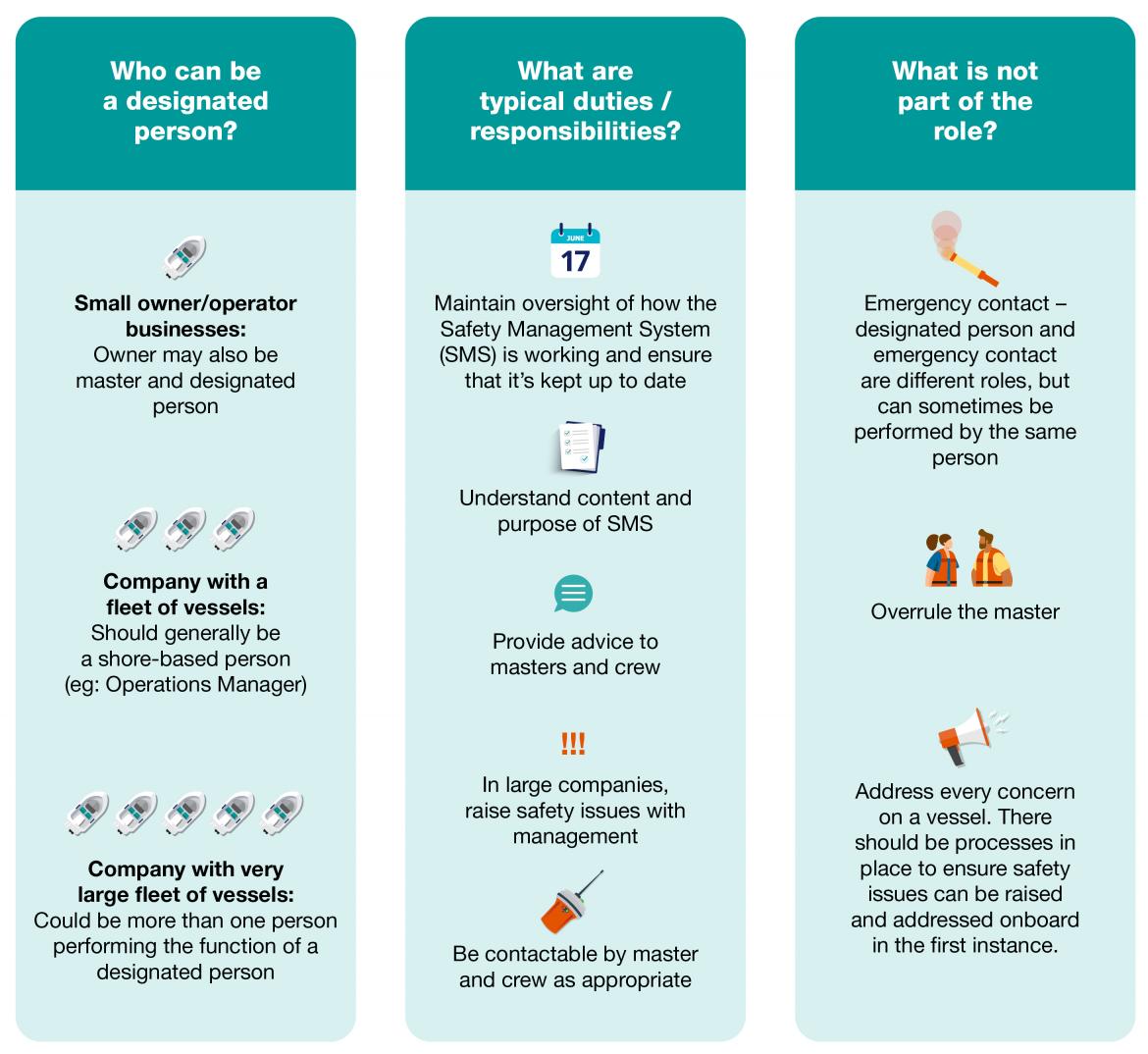On 1 June 2025, we introduced new requirements for safety management systems (SMS).
These changes affect all domestic commercial vessels. Find out what you need to do.
We also introduced simplified SMS requirements for smaller, less complex vessels. Check if your vessel is eligible.
What is the role of the designated person?
It is the designated person’s job to help implement the vessel’s safety management system.
The designated person is responsible for:
- monitoring and supporting safe operation of the vessel
- pollution prevention aspects of the vessel operation
- providing a link between those onboard and management of the organisation (for larger operations).
The designated person should be contactable by all crew working on the vessel and should be able to act on legitimate concerns. They do not need to be contactable 24/7, only as appropriate for the type of operation.
To do this effectively, the designated person needs to have direct access to the highest levels of shore-based management and should be able to ensure adequate resources and shore-based support can be provided to the vessel.
Who can be the designated person?
There is no set rule about who can hold the position of designated person and it will depend on the size of an operation, and what tasks it carries out.
For a small owner/operator set up, the owner may also be the master and designated person.
For a larger company with a fleet of vessels, the designated person should generally be a shore-based person who can oversee the implementation of the safety management system on all the vessels in the fleet. This could be someone like an Operations Manager or similar.
For companies with very large fleets, there could be more than one designated person. If this is the case, the designated person functions should be aligned so the safety management system is implemented consistently across the fleet.
The designated person role should not be delegated to people who do not have a continuous overview of vessel operations – for example, casual masters should not be expected to fulfil designated person functions.
How does the designated person carry out their duties?
The designated person needs to be able to make sure the safety management system is effective on the vessel.
They need to have a good understanding of the content and purpose of the safety management system. They need to be able to provide advice and guidance on the safety management system policies and procedures to other people in the organisation, including masters and vessel crews. They need to be able to maintain oversight of how the safety management system is working on the vessel and ensure that it is kept up to date.
In larger organisations, the designated person needs to be able to access the highest levels of management to raise safety issues onboard the vessel.
What is not the role of the designated person?
A common misconception is that the designated person is simply an emergency contact. Often the person who performs the role of designated person may also be the emergency contact point within a company – this is common as the two functions complement each other – but they are different roles.
The designated person is not there to address every concern on a vessel. There should be processes in place to ensure safety issues can be raised and addressed on board a vessel, which may then be reported to the designated person. However, the designated person must be able to act on safety issues when other processes have not been effective.
The designated person does not overrule the master on the vessel. The master retains the responsibility and authority to ensure the vessel operates safely, while the designated person can provide support to help the master do this.
Who’s your Designated Person?
Nominating a person/s to monitor vessel safety is mandatory for your Safety Management System.

Additional information
Guidance
IMO guidance - requirements to qualify as a designated person on a vessel
This is an IMO document and is intended for designated persons involved with the operation of larger international commercial vessels, however, the principles can be applied to DCV operations.
Training
Several organisations in Australia offer training courses for designated persons. These courses can be a good way for the designated person to understand their role and responsibilities.